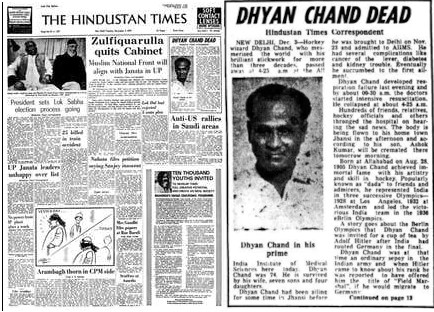
Hindustan Times report from 4 December, 1979
 ndia's
National Sports Day is observed on 29th August every year, to
commemorate the birth anniversary of Major Dhyan
Chand. To mark this occasion, a report from the front page of The
Hindustan Times from 4 December, 1979 is posted below.
ndia's
National Sports Day is observed on 29th August every year, to
commemorate the birth anniversary of Major Dhyan
Chand. To mark this occasion, a report from the front page of The
Hindustan Times from 4 December, 1979 is posted below.
Dhyan Chand Dead
Hindustan Times Correspondent
Hockey wizard Dhyan Chand, who mesmerized the world with his
brilliant stick work for more than three decades, passed away at 4:23
a.m. at the All Indian Institute of Medical Sciences here today
(December 3). Dhyan Chand was 74. He is survived by his wife, seven sons
and four daughters.
Dhyan Chand had been ailing for some time in Jhansi before he was
brought to Delhi on Nov 23 and admitted to AIIMS. He had several
complications like cancer of the lever, diabetes and kidney trouble.
Eventually he succumbed to the first ailment.
Dhyan Chand developed respiration failure last evening and by about
00-30 a.m. the doctors slated intensive resuscitation. He collapsed
before 4:25 a.m.
Hundreds of friends, relatives, hockey officials and others thronged
the hospital on hearing the news. The body is being flown to his home
town Jhansi in the afternoon and according to his son, Ashok Kumar, will
be cremated there tomorrow morning.
Born at Allahabad on Aug. 28 1905 Dhayan Chand achieved immortal fame
with his artistry and skill in hockey. Popularly known as "dada" to
friends and admirers, he represented India in three successive
Olympics-1928 at Los Angeles, 1932 at Amsterdam and led the victorious
India team in the 1936 Berlin Olympics.
A story goes about the Berlin Olympics that Dhayn Chand was invited
for a cup of tea by Adolf Hitler after India had routed Germany in the final.
Dhyan Chand was at that time an ordinary sepoy in the Indian army
when Hitler came to know about his rank he was reported to have offered
him the title of Field Marshal if he would migrate to Germany.
Another story is that most of the Europeans did not believe the
way Dhyan Chand used to sprint down with the ball glued to his stick. In
fact, some people are reported to have examined his stick to find out
whether something like a magnet was attached to his stick. They were
left bewildered when they found nothing.
Dhyan Chand rose to the rank of a Major and retained it till his
retirement In 1986. He was the recepient of Padma Bhushan in 1956 and
then joined the Rajkumari Amrit Kaur coaching scheme in 1961 as the
chief hockey coach.
PTI adds: From Amsterdam Olympics in 1928 to those at Los Angeles
1932, and Berlin 1936, Dhyan Chand enthralled the world of hockey. A
"wizard", a "juggler" he was hailed by connoisseur and critic alike.
India was an enslaved nation in 1936, but on freedom. Dhyan Chand was
not considered worthier than to be a major, to which rank he was
elevated. But more honoured he was in 1956 on conferment of Padma
Bhushan by President Rajendra Prasad.
World War II blitzed two Olympics, one to have been held In Tokyo in
1940 and another in 1944. It also ended the career of Dhyan Chand who
last played international hockey in 1948 leading an Indian team to East
Africa. On return he hung up his stick for good.
Yet in the shortened span of his career in the international arena,
Dhyan Chand scored around 400 goals, a record that has not been equalled
in the last 25 years in the course of which eight Olympics were held,
nor will it perhaps ever be equalled, let alone surpassed.
As a hockey player he was incomparable even among his illustrious
contemporaries, Jaipal Singh, A. I. S. Dara and his own brother, Roop
Singh, with whom he made a perfect combination, the former as
centre-forward and the latter as inside-left.
Hockey in the first quarter of the century was a pastime of the
British military officers and confined to cantonments. Dhyan Chand took
it to the cities of India to give birth to Indian hockey. The Indian
Hockey Federation (IHF) was born in 1925.
Born in 1906, in Allahabad, Dhyan Chand joined the Indian Army
as a sepoy, spending most of his time in Jhansi. It was here that he
perfected his game which he began playing at the age of 17.
In 1926, Dhyan Chand was a member of the Indian Army team which
toured Australia and New Zealand. The team won all its matches to put
India on the world hockey map. That was Dhyan Chand's preparation for
the first Olympics, in which India could only participate under British
flag, on the withdrawal of the British national team.
After Amsterdam came the Los Angeles Olympics which too India
won, defeating the United States by 24 coals of which eight came from
the stick of Dhyan Chand. En route matches were played in Japan and on
landing in California.
For the Berlin Olympics, Dhyan Chand led India. He was at the zenith
of his career, that war practically ended.
On his retirement in 1948, Dhyan Chand devoted himself to coaching
and took a hand in shaping the 1948 and 1952 Olympic teams under Kishan
Lal and Digvijay Singh "Babu".
If Dhyan Chand helped in the birth of Indian hockey, he had also the
misfortune of seeing its decline and fall at Rome in 1960.
Indian hockey is dead, so is Dhyan Chand.
![]()